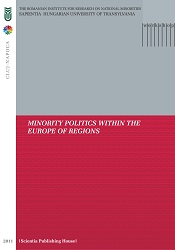Recognition/Registration Policies towards Religious Minorities: A Comparative Legal Analysis and a Human Rights-Based Analysis
Recognition/Registration Policies towards Religious Minorities: A Comparative Legal Analysis and a Human Rights-Based Analysis
Author(s): Jeroen Temperman
Subject(s): Politics / Political Sciences, Law, Constitution, Jurisprudence, Human Rights and Humanitarian Law
Published by: Scientia Kiadó
Keywords: religious minorities;Eastern European countries; state secularism; separationism; human rights law
Summary/Abstract: The issue of freedom of association is inextricably linked up with the freedoms enjoyed by organised religious groups. Focusing on Eastern European countries, this paper examines the question of what the precise legal ramifications of the norm which holds that ‘states may not discriminate between different religions and beliefs’ are in the field of registration of religions. It will be outlined that religious association laws may be used in practice to confirm and/or cover up historical financial prerogatives of the dominant and traditional religion of the state (i.e. Eastern Orthodox national churches predominantly, in most states in this region that maintain de jure or de facto ties with this religion) or to restrain the activities of religious groups (in secular states with strict interpretations of state secularism or separationism). Thus, it may be that financial support schemes are based on the prima facie neutral criteria (“all recognised/registered religions and beliefs receive funding”) but the rules for registration, in turn, are actually not. If a state’s predominant religion or church is automatically granted financial support yet other religious groups are to go through arduous procedures to reach that same level of legal recognition, the policy of allocation of financial benefits can hardly be considered ‘based on objective criteria’. The same holds true, a fortiori, if religious association laws lay out illegitimate registration criteria that non-dominant or non-traditional religious communities can simply never meet. Thus, two different issues which may both lead to discrimination against certain religions can be distinguished from each other: (i) basic recognition as a legal entity by the state (and the rights that come with this status); (ii) eligibility criteria for state funding (which is often interwoven with the issue of the status of the religious groups). On the basis of state policies towards the recognition of religious groups and, more specifically, on the basis of the terms and criteria enshrined in so-called “religious association laws”, it might happen that a religious community is denied legal entity status altogether, or a religious community might be granted this basic legal status but finds itself disadvantaged nonetheless when compared to churches or religious organisations that are granted a (higher) status making them eligible for additional benefits. The paper presents a comparative legal overview of state practice in this region so as to chart the main issues in this field. The paper will argue that registration systems as such can be reconciled with human rights law (on the basis that neither the manifestation of a religion nor the right to freedom of association is an absolute freedom). Equitable policies of recognition and registration of religions and religious organisations could in fact facilitate and accommodate religious freedoms. Having said that, state practice is that these policies are occasionally designed and implemented not with a view towards facilitating religious freedom but rather so as to tightly control the practice of religion, actively discriminate against what these governments consider dangerous ‘sects’, or privilege the traditional and predominant church. The paper will argue that the precise requirements for registration must strictly accord with the international standards on freedom of association being in conjunction with freedom of religion or belief.
Book: MINORITY POLITICS WITHIN THE EUROPE OF REGIONS
- Page Range: 425-441
- Page Count: 17
- Publication Year: 2011
- Language: English
- Content File-PDF

